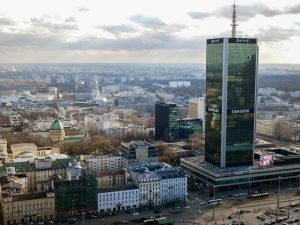Strep A antibiotics skyrocket as prices ‘hiked up to take advantage’ of demand
The cost of antibiotics needed to treat Strep A has skyrocketed – as industry professionals claim prices have been hiked up to take advantage of “unprecedented” demand.
Multiple pharmacies have warned they cannot obtain the necessary medications to treat Strep A as a 16th child died in Sussex with a suspected infection on Friday – despite the government insisting there are “sufficient” stocks and dismissing concerns about a national shortage.
But one pharmaceutical industry leader who agreed to speak to Sky News anonymously said the cost of antibiotic Amoxicillin has risen from 80p to £18.
Share your NHS experience with Sky News
Shortages have been driven by “complicated supply chains” for medications and the raw materials used to make them, in many different parts of the world.
However, the industry has also seen “volatile spikes in demand for drugs” – following a sharp decline in demand during the COVID-19 pandemic, when people were not mixing or seeing GPs.
The Department of Health and Social Care told Sky News that it is “normal” for prices to “fluctuate based on demand”.
“What’s important is patients are still able to access antibiotics, which they are,” a spokesperson said.
“We are working urgently with manufacturers and wholesalers to explore what can be done to expedite deliveries and bring forward stock they have to help ensure it gets to where it’s needed, to meet demand as quickly as possible and support access to these vital medicines.”
A letter from NHS England to pharmacists, seen by Sky News, said local pharmacy teams may be experiencing a “temporary interruption of supply of some relevant antibiotics due to increased demand.”
Supply chain disruption in China
Sky News understands there is particular disruption in the Chengdu region of China, where raw materials are sourced before being delivered to Bangladesh for manufacturing.
“The minute there is a shortage, there are people who hold stocks who will take advantage of it in order to price it however they want to price it, and they can price it pretty much wherever they like,” the industry leader said.
“So you have a lot of small, so-called short line wholesalers who will make hay while the sun shines and will be charging what they want, because they know there is enormous demand.”
The NHS gives pharmacies a price each month for drugs they have been dispensed.
But if the price falls sharply, pharmacies end up getting underpaid, the industry leader said.
“The problem pharmacists are facing is there is a big cash shortfall when you see very rapid price increases.
“Temporarily we might be able to cover the cost – but it might mean some pharmacists go bust,” they warned.
The shortage is “scare-led and demand-led” but is unlikely to continue “indefinitely” and could “fade away quite quickly”.
They likened the situation to people stockpiling toilet paper during the pandemic.
“The amount the UK requires is extremely predictable but the moment anyone suggests there isn’t enough of it, immediately it goes out of stock because you can’t ramp up capacity that quickly.”
Shortfalls will probably last for another year, they suggested.
“Unprecedented shortage”
But even a temporary shortage will be a “serious problem”, an independent pharmacist in Oxfordshire warned – describing the situation as “unprecedented”.
Faheem Ahmed told Sky News’ Adele Robinson he had just three boxes of antibiotics – with many out of stock.
“I hope it is temporary, but we are dealing with bacteria here, so when you say temporary, these bacteria multiply in minutes, seconds.
“They are not going to wait for two, three, four days so whether it is temporary or long-term, if you look at it from a scientific level…the infection is going to spread.”
Read more:
Strep A: Find out how many severe infections and scarlet fever cases are in your area
Antibiotics could be given to schools with Strep A infections
Mr Ahmed said in the 10 years since he qualified, he has never known a shortage of antibiotics – and parents are “panicking”.
The NHS would typically reimburse around £1.39 for drugs which have now risen more than double in price to £3.50.
“For some reason in the space of three to four weeks, we can’t get hold of the raw materials,” Mr Ahmed told Sky News.
“The manufacturers say ‘we don’t have it’, the suppliers don’t have it, so now we have the demand which will always be there at this time of year.
“It has gone up, supply has come down and I wouldn’t be surprised once the NHS has to pay more, I think stock will be back.”


